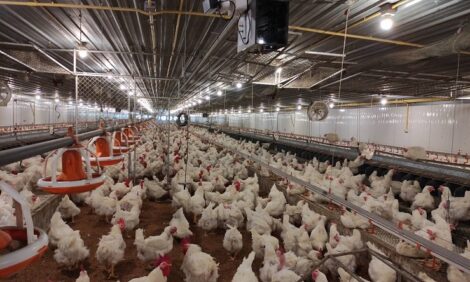



African Poultry Wrap: Disease Pressures; Poultry Price Fluctuations
AFRICA - Avian influenza disease outbreaks and smuggling of cheap poultry products are putting pressure on the poultry industry in West African countries, whilst producers in Southern African countries are struggling with price fluctuations.The avian bird flu that surfaced in West Africa this month has decimated the sector in Africa, amid fears that it could spread to other parts on the continent and the United Nations’ Food and Agriculture Organisation (FAO) calling for $20 million to fight and control the outbreak.
Other countries in the region have now temporarily banned movements of live poultry products across West Africa. There are also fears that some major export destinations will also impose import restrictions until the outbreak is brought under control.
“Fears are growing that without timely intervention to stem outbreaks of the highly virulent avian flu virus H5N1 across West Africa, further spread across the region and beyond is inevitable,” FAO said mid-July.
Cases of the latest avian flu outbreak have been reported at poultry farms and other sites in West African countries such as Ghana, Nigeria, Burkina Faso and Niger among others.
“Based on what we do know, there is a real risk of further virus spread. Urgent action is needed to strengthen veterinary investigation and reporting systems in the region and tackle the disease at the root, before there is a spillover to humans,” said Juan Lubroth, the head of FAO’s animal health service department.
Curtailed productivity and output losses owing to such outbreaks of diseases are contributing to an increase in smuggled poultry products in the West African region. Countries that have been affected the most include Nigeria.
The West African country’s Customs Service confirmed this month that it had seized huge consignments of frozen poultry products along the border with Benin.
Wale Adeniyi, the head of public relations for the Nigerian Customs Service, said in a statement that the seized consignments included about 1803 cartons of banned poultry products that were being imported into the country.
“Most of the seizures were made when commercial vehicles conveying them were apprehended by Customs Officers. However, a significant number were made on the Iyafin Badagry waterways on the Lagoon that stretches through the Nigeria – Benin Border,” he said.
Smuggling of poultry products has become problematic for Nigerian officials, with the Customs Service now urging “hotel and restaurant owners, fast food outlet operators and barbecue sellers to shun smuggled chicken.
“The protection of the Nigerian Poultry Sector is the responsibility of all,” Mr Adeniyi added in the statement. Other countries in Africa are also moving in to restrict imports of poultry to promote growth of local producers.
Statistics released in the past month indicate that Nigeria imported about 1.2 million metric tonnes of frozen chicken in 2014. The Poultry Association of Nigeria's president, Dr Ayo Oduntan, also said that the West African nation consumes about 1.5 million metric tonnes of frozen chicken per year, most of it smuggled and imported.
While other countries in Africa are battling rising imports and smuggling of chicken and other poultry products, in Southern Africa, countries such as Namibia and Zimbabwe are in a pickle over rising and declining prices of poultry.
In Namibia, the Namib Poultry Industries raised chicken prices by as much as seven per cent. It also announced this month an increase in wheat flour and maize meal, reflecting the compound effect of dry conditions in the region which have contributed to an uplift in feed stock prices and chicken prices in the region.
Namibia has also recently introduced new levies on processed products.
The Namibian Agriculture Minister, John Mutorwa says however said the poultry price increases "increases are not proportionate to the 4 per cent levy adjustment and are therefore not justifiable".
This is in stark contrast to developments in Zimbabwe’s poultry industry where chicken prices have gone down by as much as 23 per cent. This has also been blamed on cheap imports, despite Zimbabwe restricting poultry imports.
Solomon Zawe, chairperson of the Zimbabwe Poultry Association was quoted by The Source news agency saying this month that cheap imports, mainly from Brazil and neighbouring South Africa were threatening the viability of local producers.
“The poultry industry is collapsing at the moment and there is no business to talk about. Farmers have stocks which they can’t move while abattoirs are full of chickens. Prices have gone down drastically with a kilogramme of chicken now going for $1, 55 from $2,” he said.
Against the backdrop of slowing down prices, rising imports and concerns over production losses owing to avian flu outbreaks, more than 2400 households are set to benefit from the African Chicken Genetic Gains (ACGG) project.
The project focuses on providing assistance to small scale farmers, especially women, in Africa and kick-started this month when it was launched in Dar es Salaam, Tanzania.
“This project has potentials for faster growth and more egg production compared to most of our indigenous or local ecotypes.
"We focus on women because we want to improve their income to enable them to meet social obligations in their families,” said Dr Daniel Komwihangilo, acting director general of the Tanzania Livestock Research Institute.








